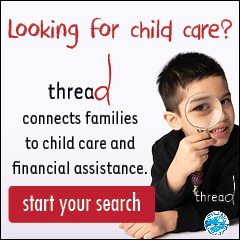
baby on a budget:
Save a Bundle on Your New Bundle
Story by Janeen Lewis
Congratulations! You either have a new bundle of joy or will bring one home soon. Having a baby is such an exciting time, but it can feel a bit stressful too. With all there is to learn and prepare for, finances shouldn’t get in the way. Here’s thrifty advice for every stage of bringing home a baby.
Before Baby
More Ways to $ave
If you are looking for additional ways to cut costs, remember little things add up and these ideas can bring big savings over time.
• Don’t remove tags. If you don’t use something or it doesn’t fit, you may be able to take it back or consign it for a higher price.
• Buy gear that grows with your baby.
• Invest in a battery charger and rechargeable batteries.
• Don’t buy shoes until your baby walks.
• Buy diaper pails that use any trash bag or throw diapers away in a trash can with a lid. Specialty diaper pail bags are more expensive.
• Buy gender neutral if you plan to have more than one child.
•
Buy diapers, formula and wipes in bulk at a wholesale warehouse club.
•
Don’t buy a lot of bottles until after baby arrives. You don’t know what the baby will prefer.
•
Breastfeed or pump, if you are able.
•
Make your own baby food.
•
Host a swap party.
• Check out freecycle.com, a place to give away or find items you need for free.
Budget early. The secret to saving and finding the best deals on quality items is planning, researching and comparing prices. Estimate costs you might incur and write a spending plan. While everything won’t unfold as expected, some things may work out better. If the stork sneaks up on you, start planning as soon as possible.
Review health insurance and savings plans. Choose a plan in which the premium to deductible ratio is the best price and value for pregnancy and childbirth care. Most health insurance policies cover the cost of breast pumps. Make sure yours does. If you have disability insurance, it may pay for maternity leave. Most importantly, start saving. Savings give a sense of peace and keep the focus on the baby in your arms instead of on financial burdens.
“Flex” financial muscles. Check to see if your employer offers a Flexible Spending Account or Health Savings Account. These pre-tax dollars can be used to buy prenatal vitamins, breast pumps, breast milk storage bags, thermometers and more. While you can purchase over-the-counter baby pain relievers, teething gel and fever reducers with an FSA or HSA, check with your insurance company. Some require prescriptions for over-the-counter medications.
Calculate the cost of different types of child care. Think about which option of childcare makes the most sense for your family – staying at home with baby, a daycare facility, nanny, or nanny share. Research the costs associated with these options. The U.S. Department of Health and Human Services considers childcare affordable when it accounts for no more than 7 percent of a family’s household income. Try to keep your child care costs within that range.
During the Pregnancy
Create a chic nursery without the designer price tag. You don’t have to be a celebrity to design a beautiful nursery. Start with a safety-approved crib and add another desirable piece. This is what new mom Emily Zolan did. “I researched and found a particular crib that I knew was safe,” she says. “I found it on Facebook Marketplace for $200 when it is usually $1,000.” Emily recommends buying a nice rocker. “You are going to be sitting in the nursery a lot, so you want to love it.”
Register and be rewarded. Create a baby registry at Amazon, Walmart, Target or Buy Buy Baby and receive free baby goodies and other perks like coupons and discounts on the items left unpurchased on your registry. The free gifts usually include samples of products you can try out when the baby arrives. You can decide what works best before you spend money on baby items you won’t use.
“Be choosy with your registry,” Emily suggests. “People naturally like to give sweet baby clothes and fun gifts. Pare down your registry to the necessities, and you may still get the fun, cute things you want.”
Spend modestly on maternity clothes. You’ll only be wearing them a few months. Budget more for maternity clothes for work than for working out. Buy staple pieces that can function for different events and activities. You can also find maternity clothes at some children’s consignment stores. For lounging around the house, baggy sweats and t-shirts are comfortable.
After the Arrival
Don’t let diapering a bottom affect your bottom line. If friends ask to give you a shower, consider having a diaper shower or make a diaper raffle part of a shower. Guests who bring a package of diapers in addition to their gift are included in a drawing for a prize.
Brooke Norris, mom to a 20-month-old and a 3-month-old, suggests having shower guests put a sticky note on diaper gifts labeling where the diapers were purchased in case you need to return for a different size. Disposable diapers like organic, plant-based or chlorine-free can be pricey; try a diaper subscription to cut down on costs if you want these specialty diapers.
It’s okay to be frugal when it comes to formula. Breast milk is free and has tremendous nutritional benefits, but it doesn’t work out for every mom. Save on formula without skimping on what your baby needs. If you buy a name brand, go to the company website and sign up for coupons and online deals. Ask your doctor for free samples and ask other moms for samples they don’t want. Keep in mind that all baby formula is regulated by the Food and Drug Administration to meet certain nutritional requirements.
Brooke discovered this with her second child.
“As first-time parents, we were nervous, so we paid more for the name brand,” she says. “I talked to my pediatrician, and we used store brand with our second child, and she’s been fine.” Brooke says she did a side-by-side comparison of the name brand formula with a store brand. “They both had the same ingredients.”
Check out consignment sales and stores. The beautiful thing about consignment is that you can get designer and name brand clothes, gear, furniture and toys at a fraction of the original cost. Baby items are outgrown so quickly that they are usually in good shape even if they are used. And once your baby is finished with an item, you can consign it. Consignment shops usually let patrons choose to receive cash or store credit for the items they sell and sweeten the pot by giving a higher amount for in-store credit.
Find high-end baby clothing on the cheap. Wait until the end of the season and buy for the next year to get upscale or designer clothing at rock bottom prices. If your child outgrows the size you buy before the next year, you can always consign the items or regift to another expectant parent.
Swap babysitting. Even the cost of paying a neighborhood teen has increased dramatically. Trade babysitting with another couple and you can still enjoy a night on the town without the expense of child care. This also helps your baby to feel comfortable with other adults, which can be a game changer in case of an emergency if you don’t have family that lives close by.
Invest in an item that’s worth the splurge. You’re more likely to stick to your budget if you don’t feel deprived. With a smart financial plan in place, pick out an extravagant or convenient, time-saving item like a car seat stroller combo, a bottle warmer, monogrammed diaper bag or a kids’ sound machine.
“The Baby Brezza is amazing,” new mom Sikedra Lamar says. This product works like a Keurig but with formula.
Brooke loves the Owlet, a sock baby monitor. Parents track their baby’s sleep patterns on their smart phone. She says it gives her peace of mind. “When Sadie had RSV (Respiratory Syncytial Virus), I knew she was breathing fine.”
Emily recommends Magnetic Me, baby clothing that comes with magnetic fasteners instead of snaps. “It makes dressing a baby faster,” she says. “When they are little, they don’t like to get cold.”
Babies don’t have to break the bank. With a specific savings plan, you can save a bundle without skimping on the things you love.









